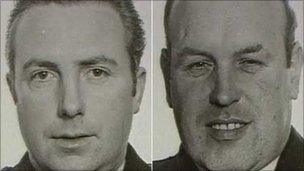RUC officers murders inquiry team met IRA leaders
- Published

A tribunal in Dublin investigating the murder of two RUC officers has revealed it met three former members of the Provisional IRA in recent weeks.
The inquiry is investigating allegations of Irish police collusion in the murder of the officers who were shot dead by the IRA in March 1989.
The three ex-IRA leaders, one of whom had a command role in the attack, met the inquiry's legal team.
Their evidence will be presented to the tribunal shortly.
In an opening statement, counsel for the inquiry said the IRA members gave detailed accounts and replied to questions from the tribunal investigators.
The two police officers - Chief Superintendent Harry Breen and Superintendent Bob Buchanan - were shot dead after a meeting at Dundalk Garda station.
On Tuesday, it emerged that Mr Breen and Mr Buchanan had been returning from a meeting with Irish police to discuss the the possibility of launching a joint operation on lands owned by Thomas 'Slab' Murphy, regarded as the most senior republican at that time in south Armagh.
Evidence to the inquiry also includes a statement from Chief Superintendent Breen's staff officer Alan Mains, in which he said Mr Breen expressed concern that a member of the Irish police was in the pay of Murphy.
In a statement on Tuesday, Sinn Fein leader Gerry Adams said the tribunal had met with his party's leadership in May 2006 to see if a meeting with the IRA leadership could be arranged.
He said this was not possible, as the IRA "had left the stage".
The BBC's Mark Simpson returns to the scene of the 1989 ambush
"But we were advised that there was the possibility of former volunteers engaging on a voluntary basis with the tribunal," he said.
"The Sinn Fein leadership worked to facilitate this.
"Having established the process between the tribunal and these former volunteers Sinn Fein played no further role in the process, though our understanding is that the people involved were in a position to answer all questions about the IRA action in which the two RUC officers were killed."
In its opening statement, the tribunal said the meeting with the IRA leaders was unprecedented and thanked those who had facilitated it.
Scappaticci
The tribunal also heard that requests for documents from the British security services had not been offered to the investigation.
Among those granted legal representation at the inquiry is former senior IRA member Freddie Scappaticci.
There will be 214 witnesses, including former RUC Special Branch officers, DUP MP Jeffrey Donaldson and journalists Kevin Myers and Toby Harndon.
Earlier, the NI Commission for Victims and Survivors expressed concern over the imposition of a deadline for the tribunal.
Commissioner Patricia MacBride said a time limit must not impact upon its independence and impartiality.
She said the commission had "a duty" to review the effectiveness of law relating to victims and survivors of conflict.
'Difficult days'
Last week, the Irish parliament backed a move by the justice minister, Alan Shatter, to impose a November deadline on the completion of its final report.
"We have requested a meeting with the justice minister, Alan Shatter, and will be seeking from him assurances that resources to complete the tribunal's work are in place," Ms McBride said.
The commissioner said the organisation was "concerned that lack of resources and time limits could have the effect of undermining confidence in the inquiry" and it wanted to ensure this was not the case.
"These are difficult days for the Buchanan and Breen families, as indeed for many families seeking answers about the deaths of their loved ones, and we have a duty as a society to support them in their search," she said.
The tribunal, headed by Judge Peter Smithwick, was established in 2005 but did not begin its formal process until March 2006.
In 2009 the attorney general confirmed that information given by potential witnesses, including an IRA informer, cannot be used in a future prosecution and any witnesses would be given immunity.
- Published1 June 2011
- Published26 May 2011